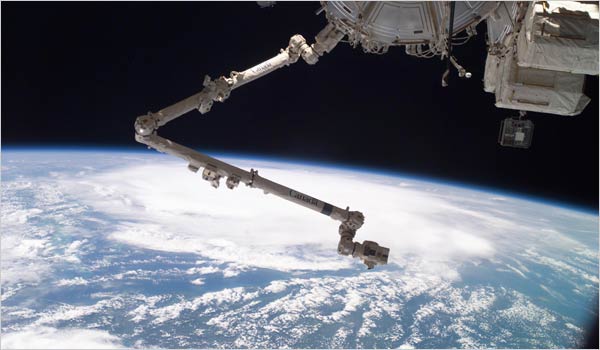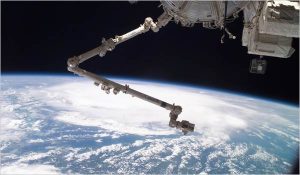

The Canadarm-2, developed by MDA for the Canadian Space Agency, flying above Hurricane Emily on the ISS (Credits: Canadian Space Agency).
The Canadian Space Agency (CSA) announced on October 27th that it will be investing in concept studies of “advanced exploration technologies”. Steve MacLean, the president of the CSA and a former CSA Chief Astronaut, said that: “space business is about turning science fiction into reality. By funding concept studies, the CSA helps nurture ingenious Canadian ideas so that our space industry can work on designing tomorrow’s space missions.”
The purpose of the studies is to “invest in emerging ideas that could become Canada’s next revolutionary technologies”. Three of the six contracts, valued at 250,000 CAD each, will focus on the growing issue orbital debris and investigate supporting existing satellite fleets:
- The Mission for Orbital Debris Elimination, contracted to COM DEV, seeks to develop “state-of-the-art Canadian robotics; visualization systems; guidance, navigation and control technologies, and techniques” to address orbital debris.
- The Clear Sky Project, contracted to MacDonald, Dettwiler, and Associates Ltd. (MDA), focuses on the design a robotic vehicle that could remove space debris to provide clear flight paths in key orbits.
- A study on Canadian On-Orbit Automated Servicing Equipment, also contracted to MDA, will demonstrate “critical technologies and techniques required to capture a satellite”, with the purpose of maintaining existing satellite fleets with on-orbit repair and refueling. Such a capability could lead allow for space debris reduction in crowded orbits.
Both MDA and COM DEV have historically been closely involved in the development of space technologies. MDA has provided a significant amount of space technology to the Canadian space program, including the Canadarm-2 and part of RADARSAT-2. A statement on the COM DEV website claims that they have supplied equipment flown on over 800 spacecraft, including 80% of all communications satellites.

















































































































![A trajectory analysis that used a computational fluid dynamics approach to determine the likely position and velocity histories of the foam (Credits: NASA Ref [1] p61).](http://www.spacesafetymagazine.com/wp-content/uploads/2014/05/fluid-dynamics-trajectory-analysis-50x50.jpg)



Leave a Reply